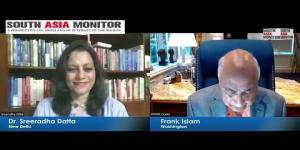Modi re-affirms India's focus on free, open Indo-Pacific
Prime Minister Narendra Modi has reaffirmed India's focus on a free, open and inclusive Indo-Pacific as also the principle of ASEAN centrality in the region

Prime Minister Narendra Modi has reaffirmed India's focus on a free, open and inclusive Indo-Pacific as also the principle of ASEAN centrality in the region. Modi, who participated in the 16th East Asia Summit hosted by Brunei through video conference on October 27, 2021, said India remains committed to strengthening respect for shared values of multilateralism and rules-based international order.
"Participated in the 16th East Asia Summit hosted by Brunei through video conference. Re-affirmed India's focus on a free, open and inclusive Indo-Pacific and the principle of ASEAN Centrality in the region," Modi said in a tweet.
"India remains committed to strengthening respect for shared values of multilateralism, rules-based international order, international law and sovereignty and territorial integrity of all nations," he added.
The East Asia Summit, which was held virtually, is the premier leaders-led forum in the Indo-Pacific. Since its inception in 2005, it has played a significant role in the strategic and geopolitical evolution of East Asia. Apart from the 10 ASEAN Member states, East Asia Summit includes India, China, Japan, the Republic of Korea, Australia, New Zealand, the United States and Russia.
India, being a founding member of the East Asia Summit, is committed to strengthening the East Asia Summit and making it more effective for dealing with contemporary challenges.
ASEAN-India summits are held annually and provide the opportunity for India and ASEAN to engage at the highest levels.
As globalisation advances and becomes more diversified, there will only be a greater appreciation of the inter-dependence and broader footprints that the Indo-Pacific expresses, Indian External Affairs Minister S Jaishankar said on Wednesday. "Given this direction, denying the Indo-Pacific is tantamount to denying globalisation," he said.
"Even those who ostensibly have reservations behave and operate in a manner that validates the Indo-Pacific. And that validation, as you all know, is in its very seamlessness and inter-penetration," he said.
He was speaking at the third Indo-Pacific Regional Dialogue (IPRD) organised by the National Maritime Foundation in New Delhi.
"What then are the expectations of the Indo-Pacific? Most of all, the likelihood that policies of states which overcome psychological limitations create more opportunities for cooperation," he said.
Not just that, also the possibility that such endeavours that would involve greater participants would be based more on respect for laws, rules and norms, he said, "This is all the more important when, in the post-COVID era, we all seek to de-risk the world from concentrated production and fragile supply chains," he added.
Amid China's muscle-flexing in the region, several countries around the world have come out with vision documents and strategies to ensure a free and inclusive Indo-Pacific.
"In the domain of international relations, it is natural that new concepts take time to be digested. To facilitate that process, it is also important to show an openness of mind and acceptance that there can be many pathways to approach the Indo-Pacific," Jaishankar said.



















Post a Comment